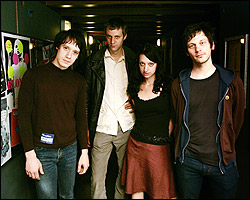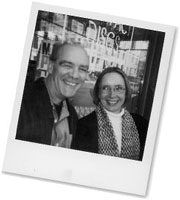There are both infinite ways of making bread and just one simple method. Like winemaking, bread making is an art and a science, and any element of the basic formula can be altered and played with. Take yeast, for example: If you have flour, water, and enough time to culture your own starter from naturally occurring wild yeasts, you’ll get bread. If, on the other hand, you’d rather use powdered baker’s yeast or import an exotic starter, those methods will also net you nice loaf, too—in shorter order. La Panzanella’s method is to add one teaspoon of dry yeast to 50 pounds of flour; at Biofournil, they use a sourdough starter from their home base in France. Regardless of how you get them, yeasts are what make bread rise. As yeasts ferment, they consume and digest sugars, and that process produces gas, which leavens the dough. Would you be able to taste the difference between breads leavened and fermented differently? That depends. How sharp is your palate, and how “sharp” do you like your bread? In order to help you think about how their methods affect you, we peeked into the toolboxes of a few local bakers and inquired about their specific formulas.
North Hill Bakery 518 15th Ave. E., 206-325-9007
At this Capitol Hill Bakery, bakers use biga to start most of their breads. “Biga” is the Italian term for the mixture of flour, water, and just a little baker’s yeast that is usually refreshed and recycled each day. Some say that keeping a biga, as opposed to starting with fresh yeast each day, yields a more complex bread.
Le Fournil 3230 Eastlake Ave. E., 206-328-6523
French-born baker Nicolas Pare augments his supply of American flour, which has relatively high amounts of gluten (which provides the protein to bind the dough together), with flour from France, which has fewer glutens. See if you think his baguette is airier, lighter.
Peggy’s Bakery Organica 301 Washington St., Sedro-Woolley, 360- 855-1688 (breads are available at all six Seattle Neighborhood Farmers Market Alliance markets)
Call them alternative artisan loaves. Peggy’s Bakery makes bread with Washington-grown spelt and emmer grains. Spelt and emmer are said to be easier to digest, and many people who can’t digest wheat breads are able to enjoy spelt breads.
Greenwood Bakery 7227 Greenwood Ave. N., 206-783-7181
Greenwood Bakery’s Chandara Samuth, a Cambodian native, uses fast-acting compressed yeast in his breads as a time-saving measure. Also called “wet yeast,” compressed yeast is considered by some to impart a very potent yeasty flavor.







